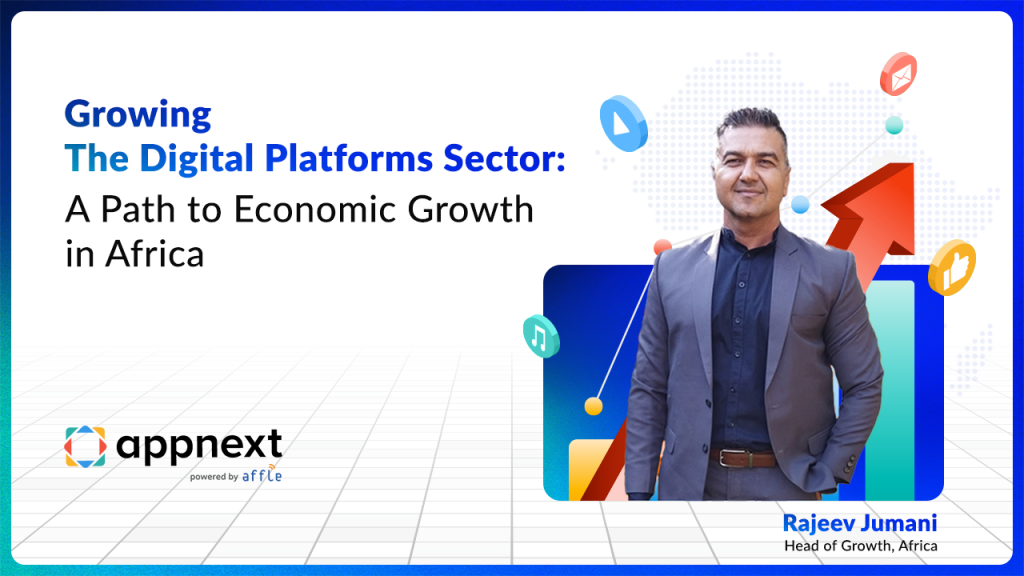
As I reflect on Africa’s future, I am filled with optimism about the transformative role digital platforms will play across the continent. Africa’s digital economy is evolving at an unprecedented pace, and the potential is immense. With 615 million mobile subscribers expected by 2025 and the digital economy projected to contribute $180 billion to Africa’s GDP by 2025 (approximately 5.2% of total GDP), the continent is poised to harness significant economic value. By 2050, this figure is anticipated to grow to $712 billion, underscoring the transformative potential of digital platforms in Africa.
The findings are promising, but what excites me even more is the opportunity this presents to create jobs, spur innovation, and enhance the way we live, work, and connect in the digital age.
The Rise of Mobile-First Consumer Behavior
Africa is at the forefront of a mobile-first revolution, reshaping consumer behavior and driving economic inclusion. With South Africa’s mobile penetration exceeding 90%, the potential of mobile technology to drive transformative economic and social change is evident. In 2022, mobile transactions accounted for 70% of the global mobile money value, with platforms like M-Pesa dominating markets in Kenya and Tanzania. By 2025, Africa is expected to host 474 million internet users, many of whom rely exclusively on mobile devices for digital access. Countries like Nigeria, Egypt, and Kenya are emerging as hubs for mobile app usage, with sectors such as e-commerce, health tech, and edtech experiencing exponential growth.
This surge has had a ripple effect, opening up vast new markets for mobile apps and services. As consumers increasingly rely on their smartphones for a range of services—from e-commerce and banking to education and entertainment—businesses are increasingly looking to mobile app development as a key strategy to engage their audiences, enhance customer experiences, and drive growth. Mobile applications are no longer peripheral—they are integral to customer engagement strategies across Africa.
At Appnext, we see this as a call to action. We are constantly innovating to ensure that users have personalized, seamless experiences across devices. We are committed to developing technologies that will accelerate this digital transformation, and I believe this is just the beginning of what’s possible in Africa’s digital future that lies in leveraging these platforms to build inclusive, scalable solutions that address both urban and rural markets.
Building an Ecosystem for Digital Growth: Key Areas of Focus
To fully capitalize on the economic potential of digital platforms, several critical factors must align.
- Infrastructure Investment: While the high smartphone penetration rate in Africa is an encouraging sign, access to affordable, high-speed internet remains a limiting factor, particularly in rural areas. Bridging this digital divide will be crucial to ensuring that all sectors of society can benefit from the digital economy.
- Skills Development: It’s a cornerstone of sustainable growth in the digital sector. Africa’s tech ecosystem is projected to create over 9 million jobs by 2030 but burgeoning tech industry requires a skilled workforce capable of developing, deploying, and maintaining the complex technologies that drive digital platforms. As companies, it is our responsibility to invest in talent and build ecosystems that nurture innovation. At Appnext, we are proud to contribute to this by cultivating a workforce that is not only technically adept but also adaptable to the ever-evolving landscape of digital technology.
- Innovation-Friendly Regulations: Regulatory frameworks must evolve to foster an environment conducive to innovation while ensuring that consumer protection remains a priority. Africa’s digital regulatory landscape must evolve to be agile enough to keep pace with technological progress. By encouraging the growth of startups and new business models, we can foster a truly dynamic digital economy. Countries like Rwanda and Ghana are adopting frameworks that encourage startups and promote data privacy, laying the groundwork for a vibrant digital economy.
- Inclusive Growth: The digital economy should benefit all Africans, not just the urban elite. It is vital to ensure that small businesses, especially those in rural and underserved areas, have the tools and resources to tap into digital platforms. With inclusive policies, we can bridge the digital divide and utilize the full potential of the digital sector for everyone. In regions like East Africa, inclusive fintech solutions have already lifted over 200,000 households out of poverty by providing access to mobile credit and savings platforms.
The Bigger Picture: A Bright Future Ahead
What excites me most about this journey is the sense of possibility. We are on the cusp of something transformative—an era where digital platforms not only fuel economic growth but also enhance lives in ways we’ve only begun to imagine. At Appnext, we are acutely aware of the pivotal role artificial intelligence (AI) and machine learning (ML) will play in shaping the future of digital platforms.
As consumer expectations shift towards highly personalized, context-driven experiences, AI and ML will serve as the backbone for delivering intelligent, real-time solutions that anticipate and meet user needs. Take, for instance, AI-powered recommendations in e-commerce. We are already seeing the ability to deliver hyper-targeted, personalized shopping experiences that not only increase conversion rates but also enhance user satisfaction.
By continuously innovating and focusing on user-centered experiences, we can help businesses reach new audiences and empower consumers with the tools they need to live better lives.
A Collaborative Vision for South Africa’s Digital Future
In closing, I believe that Africa stands at the threshold of a digital renaissance. The continent’s potential to lead in the global digital economy is undeniable, but it requires a united effort across industries, governments, and communities. The opportunities are boundless, and I look forward to seeing how we, as an industry, can continue to push the boundaries of what is possible in this exciting new era.
The future is collaborative. As Africa’s digital platforms sector evolves, we have the opportunity to not only drive economic growth but also redefine how technology impacts lives. Together, we can ensure that Africa’s digital transformation is inclusive, innovative, and sustainable—paving the way for a brighter, more connected future.
At Appnext, we are proud to be at the forefront of this journey, shaping Africa’s digital landscape and driving forward the immense potential that lies ahead. Our focus is on fostering innovation, enabling businesses to harness the power of digital platforms, and creating meaningful, personalized user experiences that resonate across diverse markets. By continuing to push boundaries, we aim to transform how consumers and businesses across the continent engage with technology, contributing to Africa’s dynamic digital future.



Comments are closed.